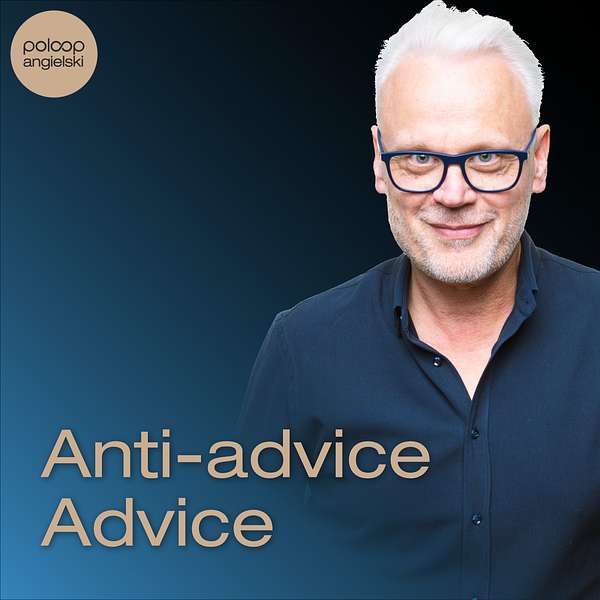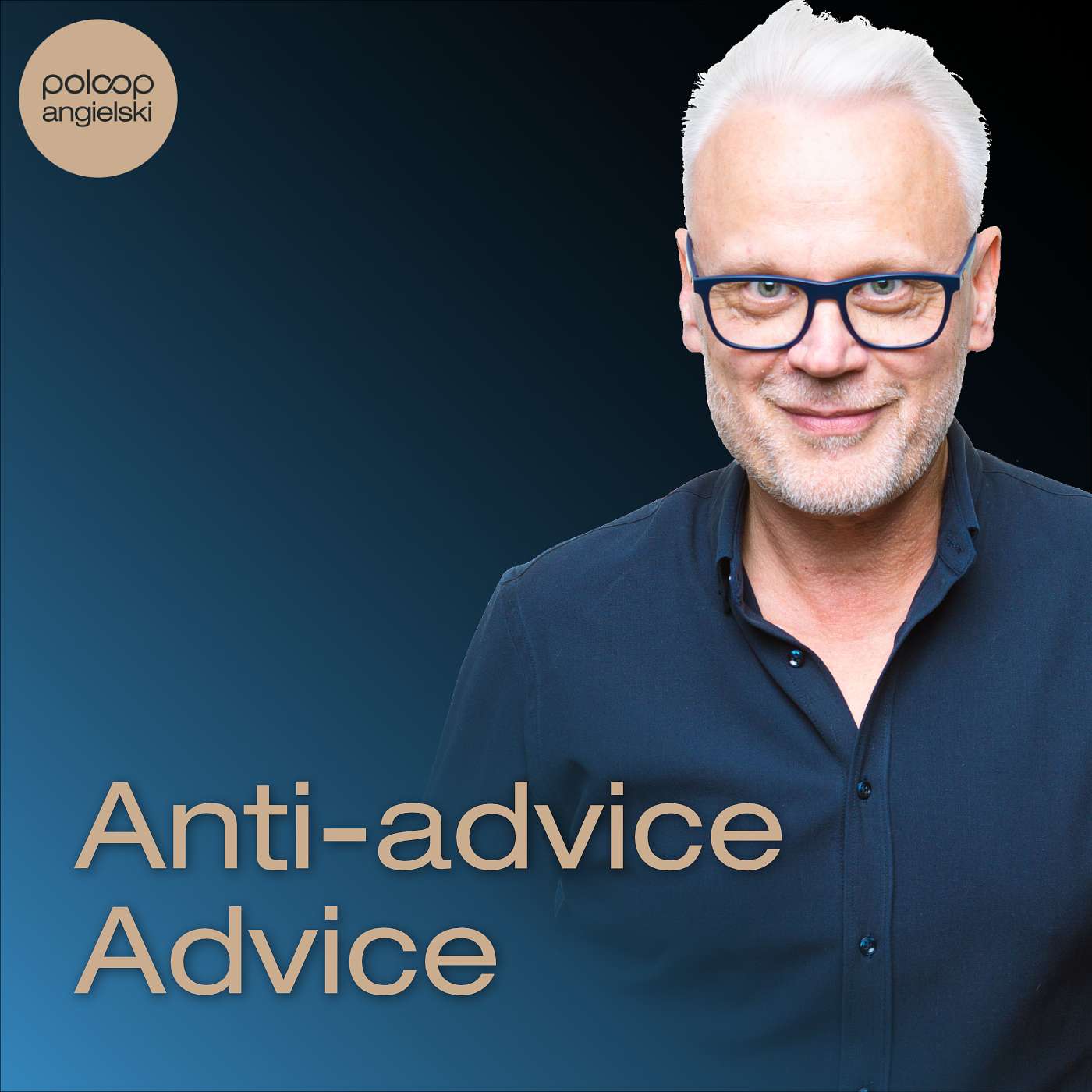
PoLoop Angielski
PoLoop Angielski
Episode 25. Anti-advice Advice
What trap do polyglots and teachers of foreign languages fall into when advising learners? Should you listen to the advice of those who've mastered a foreign language? What is the right approach when choosing suitable methods of learning?
In this episode, I tackle these questions using some insights from Rory Sutherland's book "Alchemy".
You can download the complete transcript of this episode here.
For more, visit: PoLoop Angielski Blog
Drop me a line: jacek@poloopangielski.pl
And join us on social media: Instagram and Facebook
Would you like me to help you master your English? You can find out more about my courses here.
0:01
Hello, I'm Jacek Olender, and this is Poloop Angielski Podcast. For more materials for learners of English and the transcript of this episode, go to my website, poloopangielski.pl
0:17
I'm sure in your lifetime you've come across plenty of advice on how to learn English. On social media, you're constantly bombarded with advice on what you should or shouldn't do. If we exclude those who promise miracles for some personal gain, preying on people's hunger for quick fixes, we are still left with many decent people whose intentions are good. They are the people who want to share their insights about what has worked for them, convinced that because they've succeeded, you should too, if you only follow their advice. They do this with the best intentions and are confident that they are right. They are often polyglots. They seem so sure they have cracked the code, that not sharing the secret with others appears to them as a sin. They are not only polyglots, but teachers like myself, who are on a mission to make you fluent. This episode is on why we are like that, and why you should take what we say with a pinch of salt.
1:37
Imagine you have a problem, let's say, in your relationship, and you come across someone who has successfully dealt with a similar situation, for example, someone who's had many relationship issues, and now is happily married with three children, asking them for advice sounds like a good idea. And assuming they have good intentions, they will try to help you by giving their advice. But the problem is that the advice they will give you is not based on your life and experience, but on theirs. The advice they will give you might be excellent, but for them, not for you. You see, we all fall into the trap of assuming that how we achieved a specific goal is the best just because we've done it. When something works, or when you think something works, it is easy to be fooled into believing that it is the right way to do it, and even worse, that it is the only way to do it. If you try something and realise that it works for you, it's easy to conclude that everyone can do it the same way and succeed. That's why people who quit smoking, lose weight, go vegan, are eager to tell others what they should do to achieve the same results. It's hard for them to realise that the way they did it worked for them, but it might not work for others. And to be frank, I shouldn't use the pronoun 'they', but rather 'we' because I'm not different in this respect. It's also hard for me to break away from the habit of sharing life advice with others, as many of my students would probably confirm. I'm a self proclaimed sleep evangelist, for example, and I often try to persuade my students to change their sleep habits. 'Go to bed early and get up at dawn.' That's what I say. I'm so sure that I'm right that when I hear someone saying they are night owls and prefer to stay up late and lie in the following day, I have a knee-jerk reaction to tell them they are wrong. It takes a lot of mental effort to stop yourself from telling others how wrong they are if your experience tells you so.
4:14
Does it mean teachers should stop giving students advice based on their experience? Definitely not. It is one of the teachers most essential tasks to guide students in acquiring knowledge and skills. We should however, avoid believing in single answers to solve students problems. I've come across teachers who are so stuck in their ways, so invested in their approach, even when they realise it's wrong. Why? Because of the trap of trusting your own experience. Since I learned the language by watching films, my students could do so too. Because I became fluent by hanging out with native speakers, this is the best method for my students. As I learned so much vocabulary from song lyrics, my students should stay clear of grammar, and instead listen to Taylor Swift all the time. Problem solving is hard. So if we crack the code of what's good for us, we fall into the trap of believing that's the best, or the only solution. That's when you should take a step back and say to yourself, "I wonder if this is the only way. I wonder if there might be another equally good or even better way to get to where I want my students to get." Achieving the outcome we want, doesn't give us the right to feel comfortable, complacent that we know best how to get there. There could be a few ways leading to the same destination. And teachers as well students should realise that before they get hooked on a single recipe; they should consider them they should try them out.
5:59
So what is my advice to you? In this anti-advice episode?, I found a good set of guidelines in the book by Rory Sutherland, the vice chairman of Ogilvy Group UK, one of marketing and advertising gurus, but also an original thinker and inspirational speaker. His book 'Alchemy', which argues that thinking irrationally can help with problem solving contains many interesting insights into human behaviour generally. But I'd like to focus just on three.
6:36
Insight number one, the opposite of a good idea can be another good idea. There are a lot of ways to reach the desired outcome, and we should make good use of them. Don't think that just because something worked for someone else, it will work for you. If you don't like reading novels in your native language, don't think reading in English will make you fluent, even though someone vows that this is how they've mastered the language. The same is true about learning English from songs or watching movies. This could be great if you're interested in music or cinema, but useless if you're not.
7:16
Lesson two: problem solving requires a multiple-pronged approach. Very rarely, just one thing lets us solve the problem. So even if watching films is your hobby, and you successfully use it to improve your skills, no matter how many series or movies, you watch, Netflix or HBO will not make you a fluent speaker of English. It doesn't make sense to limit yourself to one path. Don't be afraid to test different methods. A good teacher could help you in this process, but it is you who will ultimately have to figure out what works for you.
7:59
Finally, lesson three, remember that small changes can make a significant difference. We often think we must make a revolutionary change to have a huge effect. However, sometimes a few tweaks here and there, introduced in your learning process could bring about beneficial results. Switching off subtitles, or reading for gist rather than stopping and translating every word in a book you're reading, learning new words in the context, using a mono-lingual dictionary instead of online translation tools might be enough to do the trick. And above all, remember, listen to advice, but take it with a pinch of salt, especially if the advice sells a single simple solution to something as complex as acquiring a foreign language. That's it for today. Thank you for listening. Take care. Hope to talk to you next week. Bye.
Transcribed by https://otter.ai




